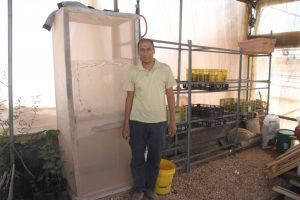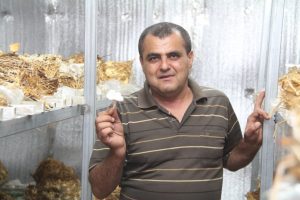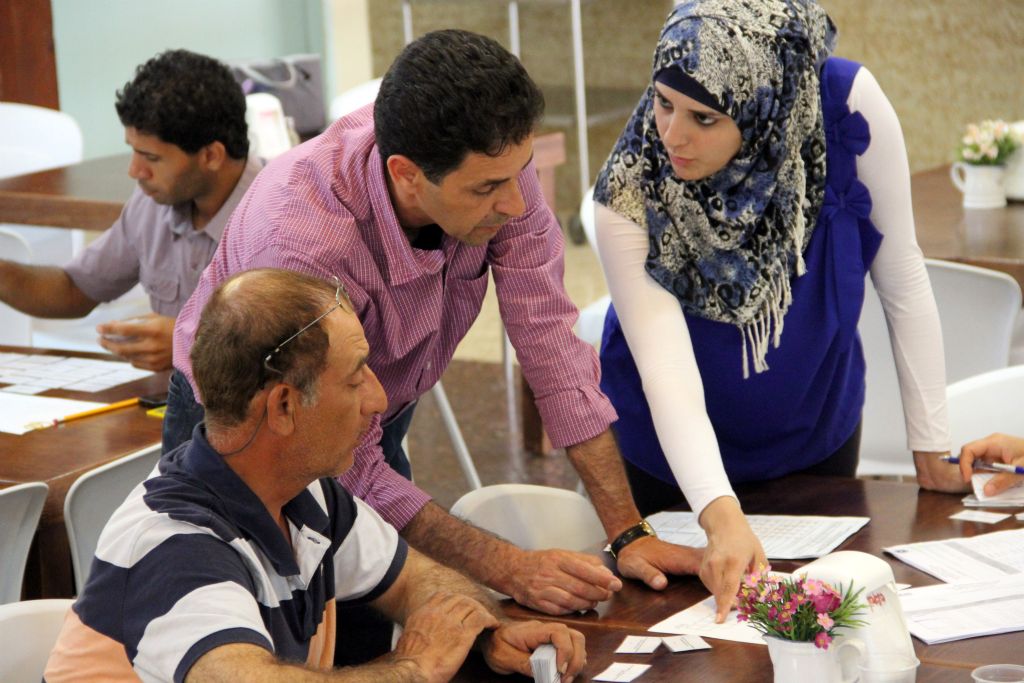Prior to the Second Intifada, regular economic cooperation, cross-border employment opportunities, and a network of social relations existed between Palestinians and Israelis. When the construction of the separation barrier began in 2000, mobility along with social and economic interactions became severely limited, resulting in a generation of Palestinian and Israeli youth who have never known people from the “other side.”
Adi grew up in northern Israel where she had little to no interaction with Palestinians in the West Bank. When she heard about the Near East Foundation’s Youth Agribusiness Partnership (YAP) initiative, Adi jumped at the opportunity to get involved.
The YAP initiative, funded by the United States Agency for International Development (USAID) and implemented by the Near East Foundation (NEF) and its partners—the Peres Center for Peace and the Palestinian Center for Agricultural Research and Development (PCARD), aims to build lasting relationships of trust and collaboration between Israelis and Palestinians through cross-border economic collaboration. This initiative builds on NEF’s past successes implementing similar projects in the region, but with a unique twist in that it specifically targets young Palestinian and Israeli women and men—whose interaction with the “other side” has been severely limited.
The YAP initiative focuses on sectors where there is a demonstrated opportunity to improve productivity and market linkages. These include fruits and vegetables, dates, herbs, and small ruminants (particularly dairy).
In each sector, there are significant gaps in technology and productivity between Israelis and Palestinians, but there are also opportunities to expand production and markets in both areas. In facilitating joint-cross border agribusiness enterprises, jobs are created, income is generated, markets are expanding, and young Palestinians and Israelis gain hands-on experience in business cooperation and conflict management.
“I believe in collaboration between people.” – Adi
Adi and Salah
 |
 |
Adi, an Israeli botanist, makes a living cultivating Black Soldier Fly larvae. This particular type of larvae consumes organic waste, helping to reduce it. After engorging themselves on the waste, the protein-rich larvae can be used as a very nutritional source of animal feed. “I am becoming an expert in making the larvae, and they [Palestinians] have a lot of problems with the build-up of organic waste.”
Adi wanted to share her expertise on how to cultivate the larvae with Palestinians because she thought it not only would have a positive environmental influence and be a source for nutritional animal feed for farmers, but also help to create jobs.
“There are a lot of people who don’t have work [in the West Bank],” Adi said. “Cultivating the larvae creates an opportunity for many people to get work, help the environment, and to make money.”
Through the project, Adi was introduced to Salah, a Palestinian fish farmer, who was searching for a way to improve his product and his family’s future.
Salah operates his fish farm near the village of Tubas in the West Bank. Salah explained that collaborating with Adi and the “other side” provided a “rare opportunity to improve his future and to learn from agricultural experts.” He went on to say, “The high protein content provided by the fly larvae will make the fish I cultivate more hardy and robust, which will hopefully positively affect my production and sales.”
The project organizes opportunities for Israelis and Palestinians to go on field visits to both Israel and the West Bank in order to promote knowledge sharing. Salah said he enjoyed these learning opportunities the most out of all of the project activities: “The field visits and the techniques discussed during the lectures and the technologies we encountered where interesting—I learned how to better cultivate and sell my product [fish].”
“I learned a great deal from the Israeli agricultural experts that NEF put us in touch with, and I have benefitted a lot from Adi’s technical expertise.”
Adi also felt that the field visits and trainings provided a unique opportunity. “The meetings were very interesting. The main thing [for me] was to have a chance to meet our neighbors, person-to-person…woman-to-woman… man-to-man. This was the main thing.”
Adi went on to say, “The project gave us an opportunity to meet with them [Palestinians]. It can be risky to travel to Nablus, but when I go as a guest with Palestinians there is nothing to fear. We went to Nablus, and it was so interesting. All of my colleagues were really enthusiastic about it—we believe that people can connect, not politicians.”
“I don’t want it to stop,” Adi said. “I want it to continue! And I want the connection to continue too.”
Salah hopes that his community sees how he is benefitting from his participation in the project. He said, “Neither my family or friends have any problem with my participation in the project whatsoever. In fact, they’d love to participate in something like this too!”
Musa and Amin
 Musa, a Palestinian sheepherder and the mayor of Al Jiftlik in the West Bank, was in search of a solution to improve the health of his sheep and to increase the milk they produced, especially during the winter and the extreme temperatures and dryness of mid-summer.
Musa, a Palestinian sheepherder and the mayor of Al Jiftlik in the West Bank, was in search of a solution to improve the health of his sheep and to increase the milk they produced, especially during the winter and the extreme temperatures and dryness of mid-summer.
“Sheep require 24-hour supervision,” he said. “The warm climate creates health problems for my sheep. The grass that they graze on is not very beneficial in terms of nutrition.”
Musa went on to explain that the nutrition-poor feed that is locally available to his sheep directly affects the quantity and quality of the milk they are able to produce, which then negatively impacts the quality of cheese he makes—often leading to certain years where no milk or cheese can be produced and sold.
Through YAP, Musa was connected to Amin—an Israeli farmer. Musa went on to explain that the nutrition-poor feed that is locally available to his sheep directly affects the quantity and quality of the milk they are able to produce, which then negatively impacts the quality of cheese he makes—often leading to years where no milk or cheese can be produced and sold.
“The main reason I wanted to be a part of the [YAP] project was to gain knowledge. In the beginning, I didn’t want farming equipment or money, I just wanted to exchange information, knowledge, and experience,” said Musa.
Amin brings hay from Israel to Musa’s farm in the West Bank; hay that is superior to what Musa typically has access to in Al Jiftlik. Musa then mixes the hay with his crop waste and compacts the mixture with machines purchased with the project grant to make silage as a supplemental food source for his sheep.
“The feed from the silage has far more nutrition than what we used to have. We do not have that quality here [in the West Bank].” Musa said. “This year there is plenty of food, milk, and cheese. In previous years there was neither the quality nor quantity. With the profits from these products, my expenses in the off-season have been cut in half!”
“There should be an exchange of experience between Israelis and Palestinians,” added Musa. “Why? Because the Israelis and I live on one land.”
Musa went on to say that, “Working with my partner [Amin] has helped me to develop my own expertise. We here in Al Jiftlik benefit from getting to know our partners, and they benefit from getting to know us. NEF helped to facilitate this cooperation; for example, I was able to visit Israel on a study tour where they have big farms and good ideas to share!”
Masha’al and Etai
 |
 |
Masha’al, a 21-year-old woman from Al Jiftlik in the West Bank, started a small business as part of the YAP initiative making a healthy coffee-like beverage out of date seeds. Despite the uniqueness of her product, Masha’al faced many challenges with her business such poor infrastructure for her operation.
“I have challenges because of fluctuations in the electrical supply, so I work at night when it is stronger. Also the marketing aspect of my business has been very slow in developing.”
To make enough of a profit to support herself and her family, Masha’al knew that she needed guidance and support. When Masha’al came across the YAP project she saw it as a great opportunity to improve her business knowledge and plan so that she could take her small coffee business to the next level. “Through the project I am able to get to know other people, they help me with gaps in my overall business acumen…my marketing abilities and how to acquire the raw materials I need more cost-effectively.”
Through the project, Masha’al was connected to Etai—an aspiring Israeli entrepreneur from Tel Aviv who was interested in developing and selling a natural and healthy type of coffee in Israel.
“I’ve had this business idea to open a sort of alternative healthy beverage stand for a long time,” he said. When contemplating whether or not to join the YAP project Etai figured, “What do I have to lose?”
Etai’s primary reason for joining the YAP project was because he saw it as an opportunity to meet people from the “other side.” He explained, “One of my family members used to work with people from the other side. They did it because it was good for both sides…people these days don’t even think about it because it’s so hard [logistically].”
Together, with the assistance of the YAP project Masha’al and Etai developed a plan where they would manufacture the date coffee (in the West Bank and Israel), and then market and sell their products on both sides—expanding their market base while cooperating together to perfect their business model. Etai also introduced Masha’al to better date seeds from Israel so that she could improve the quality of her coffee.
Through collaboration with experts from Syracuse University’s Program for the Advancement of Conflict and Collaboration, the YAP training curriculum includes teaching tools and techniques geared toward collaboration and conflict mitigation. Etai particularly enjoyed the training sessions and getting to visit with and learn from other entrepreneurs.
“The trainings allowed me to network with other people who are connected to what I want to do. Moreover, in-between sessions, we were able to talk, brainstorm, and just get to know each other a little. During the first meeting, we had a conversation about if we were afraid of the “other side”—it was great to open up about such matters and not just connect solely on business-related issues.”
Masha’al spoke favorably of her experience working with Etai, saying, “The cooperation between us has been really great; we help one another. We learned a lot about running a business that we were unaware of before.” She continued, “I thought that they [the Israelis] liked to do things on their own and had no interest in working with us, but my view changed when I saw how they wanted to work and collaborate with us.”
Othman and Nitzan
 |
 |
Othman is an organic mushroom farmer from Lubban Village in the West Bank. “My business is to convert mushroom spores into mushroom seeds to make it easier for other farmers to plant and grow mushrooms,” Othman explained.
“Mushrooms are not common to the area. It is a challenge to increase the shelf life of the mushrooms, which is normally very short. I needed expertise on how to do this without using chemicals; my mushrooms are organic through and through!”
It was through the YAP project that Othman was introduced to Nitzan, an Israeli woman who owns and operates an aqua/hydroponics facility (a method of growing plants in mineral nutrient solutions without soil) in Israel. “I’ve learned a lot from Nitzan’s technical experience—she has an MS in agricultural sciences, and she has taught me many things.”
For Nitzan, being a part of the YAP project provides her with an opportunity to share her knowledge on hydroponic farming with Palestinians, while also having the opportunity to connect and learn from them. Nitzan said that when she first met Othman, his eagerness to learn was evident, “I saw the need. He asked all the right questions. When a connection is there, the work can easily get done.” She went on to say that she feels that “the small steps of working together on a joint-project gives me the assurance that there will be a mutual future.”
“There is great cooperation between us,” Othman said. “We have met several times during the project, and I have toured Nitzan’s hydroponic facility. We’ve gotten to know each other and become friends. Nitzan is very knowledgeable in agriculture, and I depend on her considerably.”
“It was good to see the willingness from the other side,” Nitzan said. “Instead of just talking, we should take action—these small steps will lead to a kind of momentum.”
117 Israeli and Palestinian youth have participated in YAP cross-border training workshops and field trips, 51 joint cross borders business plans have been submitted to NEF for funding, and 30 have launched.
The YAP project is funded by the USAID, and in partnership with the Peres Center for Peace and the Palestinian Center for Agriculture Research and Development (PCARD).



